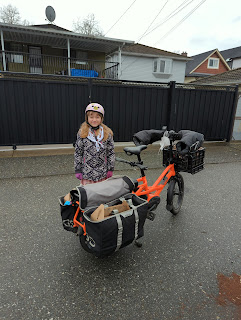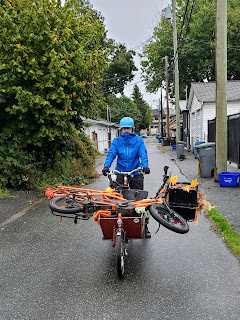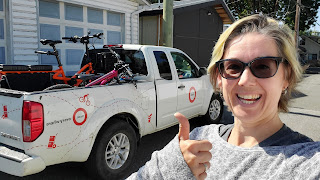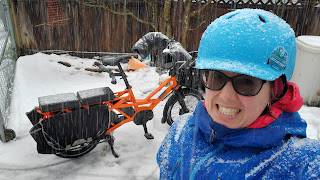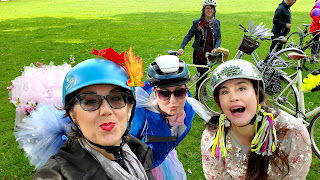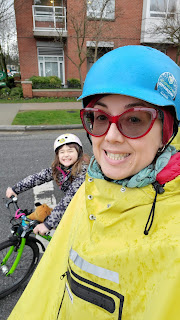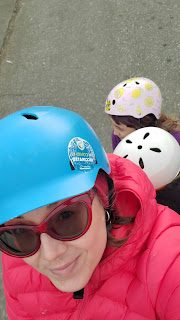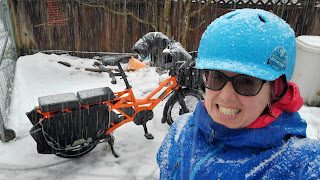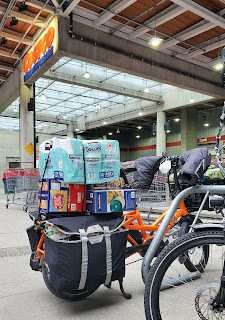Welp, that was... a year. Our transportation costs were lower than ever because we went nowhere & did nothing, basically. Oliver worked from home three quarters of the year, the HUB Cycling Ed spring & summer seasons were cancelled, & the fall was less work than usual, still thanks to COVID. We deliberated bike camping, but decided not to, & any other travel farther afield was right out.
This year was even easier to calculate than previous years: no taxis, no ridesharing, no car rentals, no ferries. We got around by bike the vast majority of the time which costs us virtually nothing.
Our biggest expense of the year was bike maintenance, mainly brake pads, a few replacement parts. A lot of it was my Tern GSD, because that's the workhorse in our fleet, but Oliver did have a little work done on his Brodie Romax in January. The kids' bikes & the rest of our bikes didn't need much, except replacing the kickstand on our Yuba Mundo. All told, bike maintenance was roughly $60 a month, $708.71.
I think I spent about $8 on electricity charging my Tern GSD. I really have no idea how often I charged it or how many complete charge cycles I did in 2020, but based on previous stats the last time my Tern dealer plugged it in, I estimate about 65 full charges of the 900Wh of batteries in the roughly 5000km I rode.
We both renewed our
Mobi Community passes, which cost $20 each. I only used Mobi for 16 one-way trips, & Oliver likely rode even fewer times than I did but the pass was still well worth the cost. It's really handy to have access to for one way trips to transit or when dropping off & picking up a bike from the shop. Total: $40.
I took two transit trips all year, one of which was paid by work, & the rest of the family didnt take transit at all. Grand total cost to me was $6.90.
We also drove very little, since most of our Modo trips tend to be for family birthdays & holiday dinners, & those were all cancelled. We usually rent a car to visit Oli's family in the Okanagan, but decided not to bring our potential germs to his elderly father this year.
Back in The Before Times we did a few Modo trips, then none at all until September, when we picked up a couch with a Modo cargo van. Then one outing to see Winterlights in December. I also made a booking for work, but again, this was paid by my employer so I don't count it toward our family's total. Modo costs for the year came to $273.63.
Interestingly, our transportation costs were not that much lower than 2019, but again, that wasn't a banner year for going anywhere either, with my broken ankle, & Oliver's new job. We spent roughly $650 more that year. 2018 was more of a typical year for us, with some travel in BC, Washington, & Oregon, including a few bike camping trips & visits to the Okanagan to see family there. 2018 came out to nearly four times what we spent this year. If you're curious about the numbers you can check out my posts on the breakdown for
2018 here, &
2019 here.
So, now, the moment you've been waiting for... the grand total transportation costs for our #CarFreeFamily of four in Vancouver in 2020 was...
$1039.24.
It's eight or ten times less than we'd be spending if we owned a car. Just the insurance would be more, whether we drove it much or not. Reducing transportation costs by cycling rather than driving makes such a huge difference to the affordability of living in Vancouver. The other downsides--getting a bit wet or cold occasionally, dealing with shitty drivers--are outweighed by all the other upsides--built in exercise & fresh air, more social interactions, easier parking, near zero carbon produced, often faster. Still pretty happy to be a #CarFreeFamily.
So, how about you? What did you spend on transportation last year? Do you total it up annually? What are the upsides & downsides of how you get around?
